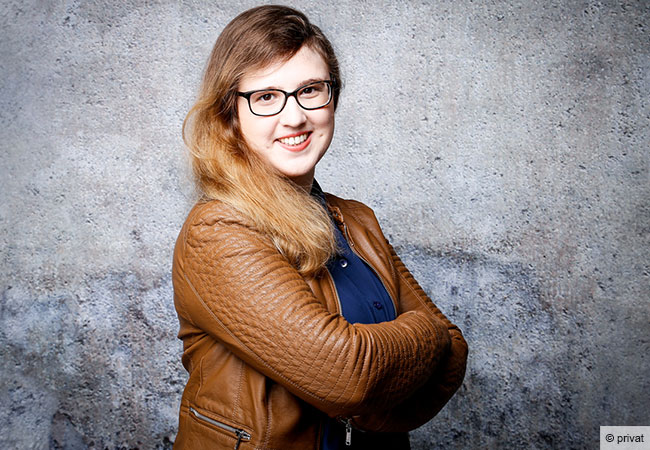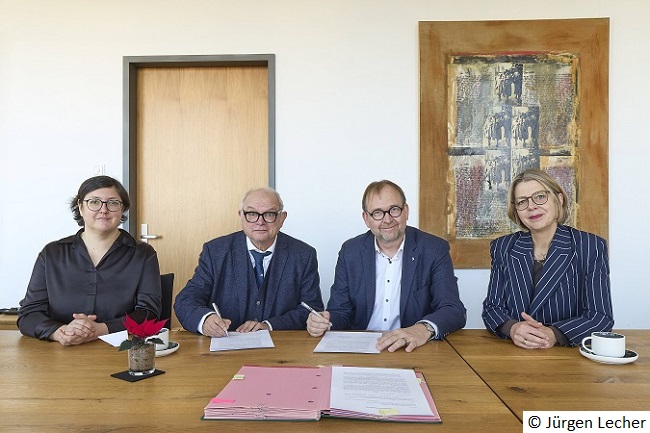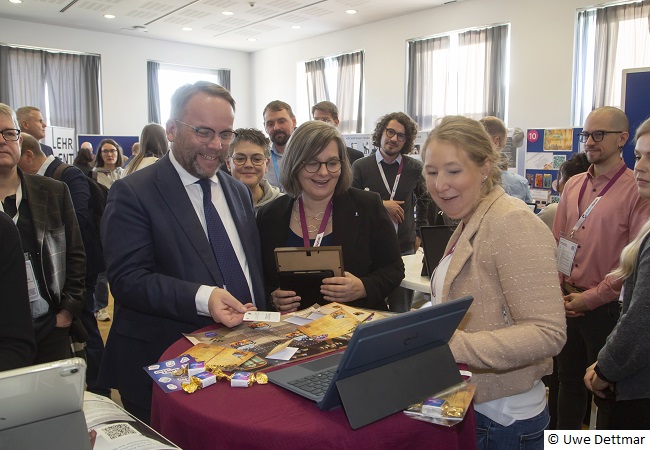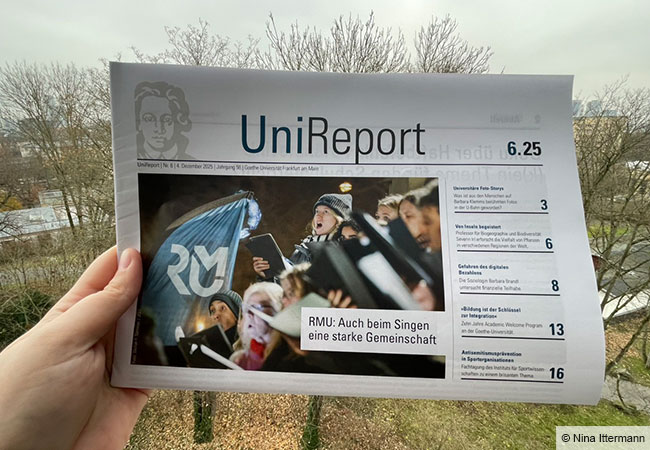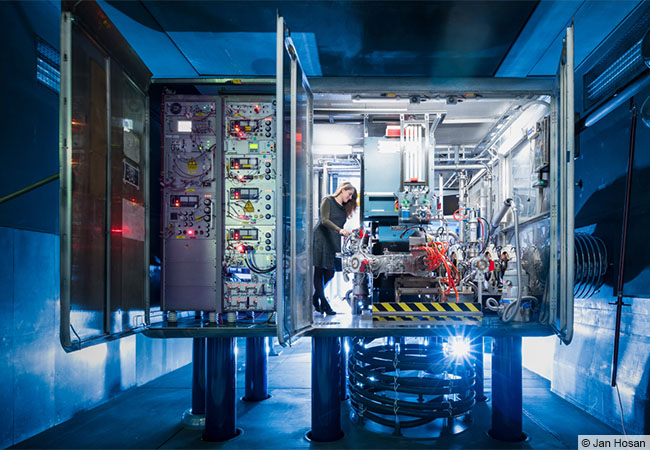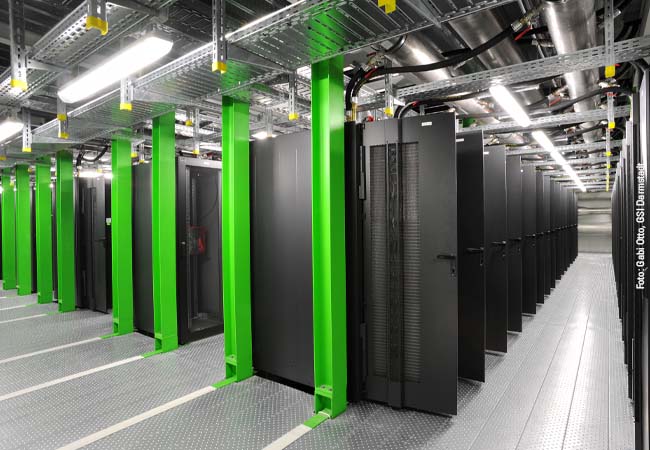
Having undergone extensive renewal works, the „Goethe NHR“ mainframe, part of the Konsortium Nationales Hochleistungsrechnen Süd-West [National High-Performance Computing (NHR) South-West consortium], is now one of the two most resource-efficient in Germany, and ranked 9th worldwide
Goethe University is boosting its particularly energy-efficient mainframe power within the framework of the National High-Performance Computing (NHR) South-West consortium. Official rankings show that „Goethe NHR“ ranks second among Germany’s most energy-efficient mainframe computers, and holds sixth position nationally when it comes to speed. The mainframe is also a frontrunner in the worldwide „Green 500“ ranking, where it stands at ninth place. The result is particularly remarkable considering the much lower investment volume compared to other mainframes, as well as the fact that both students and doctoral candidates have played and continue to play a vital role in the project’s success.
Goethe University has been a member of the NHR South-West consortium since October 2021. Set up at the suggestion of the Joint Science Conference of the federal and state governments (Gemeinsame Wissenschaftskonferenz, GWK), the consortium also includes Johannes Gutenberg University Mainz (JGU), the RPTU Kaiserslautern-Landau technical university of the federal state of Rhineland-Palatinate, and Saarland University. Developed by Prof. Dr. Volker Lindenstruth, the technology for energy-saving high-performance computers already received financial support from the state of Hesse in the past, including one million euros from the Innovation Fund and 850,000 euros from the LOEWE research funding program [known by its German acronym, LOEWE stands for Hesse’s state offensive for the development of scientific and economic excellence].
„The updated ‘Goethe NHR’ strengthens our university’s position within the NHR network,“ says Lindenstruth, who heads Goethe University’s „Architecture of High-Performance Computers“ working group. Lindenstruth is one of Germany’s most renowned experts on the optimization and energy efficiency of mainframe computers. In the past 10 years, computers designed by him often held top positions in both national and international rankings of the most energy-efficient supercomputers, published every six months.
„By upgrading the former Goethe HLR computer to the significantly more powerful Goethe NHR, we are opening up new research possibilities for scientific users nationwide within the framework of the NHR South West consortium. The fact that we ended up building one of Germany’s most energy-efficient HPC computers is a particular highlight, especially considering the necessary transformation to sustainable systems and the high energy costs,“ says Prof. Dr. Thorsten Kollegger, professor of Green IT at Goethe University, and head of the Center for Scientific Computing, which operates the university’s HPC systems.
Goethe University President Prof. Dr. Enrico Schleiff congratulated Lindenstruth and Kollegger on their success in sustainably optimizing mainframes: „Thanks to the outstanding efforts of this work group, Goethe University is a pioneer in the field of green mainframes in Germany and beyond. It is remarkable how, time and again, Volker Lindenstruth and his team succeed in reaching top national and international rankings with the computers they design. When it comes to providing the most efficient and sustainably produced computing power for research, Goethe University is very well positioned – both within the NHR consortium and within Germany. Our partners in the NHR computing network also benefit from this unique knowhow. It’s nice to see students and early career researchers involved in this success – further proof of the excellent work of this working group’s young scientists.“
The „Goethe NHR“ mainframe computer, which Lindenstruth and his team have now significantly renewed, and which is located in the Frankfurt-Hoechst Industrial Park, is based on the tried and tested, but significantly refined intelligent networking and individual optimization technology of 880 AMD MI210 graphics cards. This allows powerful mainframes to be built in a particularly cost-effective and energy-efficient manner.
Facts and figures
Computing power: 9.087 PFlop/s with 105 nodes at 195.24 kW
Computing efficiency: 46.5 GigaFlops/W (floating point operations per watt of computing power per second)
Germany’s National High Performance Computing Alliance (Verbund des Nationalen Hochleistungsrechnen, NHR) / Powerful supercomputers are becoming increasingly important in science and research. Faced with handling complex and vast amounts of data, researchers across a wide range of disciplines are more dependent than ever on high-performance computers. Nowadays, a growing number of research questions, including in medicine, physics or chemistry, can only be answered using large computing capacities and intelligent applications. That is why, in 2018, the federal and state governments decided to establish a Germany-wide National High Performance Computing Alliance, tasked with bundling and further expanding the existing strengths of high-performance computing centers in a national network. The setting up of a coordinated alliance was a direct response to rising demand for high-performance computing, to enable university researchers across Germany to access the computing capacities they need, irrespective of their individual location and in line with their requirements.
The NHR also aims to further develop and better coordinate the specialized and methodological strengths of high-performance computing centers. At the same time, training courses and advanced training offered at the nine NHR centers will introduce more researchers to high-performance computing, strengthen the skills of high-performance computing systems’ users, and promote young talent with a view towards fully exploiting the potential of high-performance computing and strengthening Germany as a location for research and innovation. The NHR has been endowed with a total of 625 million euros over a 10-year funding period.


